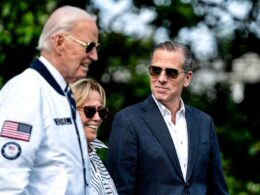The U.S. and Russia completed on Thursday their largest prisoner swap in post-Soviet history, a deal involving 24 people, many months of negotiations and concessions from other European countries who released individuals in their custody as part of the exchange
Things to know about the largest US-Russia prisoner swap in post-Soviet historyBy ERIC TUCKERAssociated PressThe Associated PressWASHINGTON
WASHINGTON (AP) — The U.S. and Russia on Thursday completed their largest prisoner swap in post-Soviet history, a deal involving 24 people, many months of negotiations and concessions from other European countries who released Russians in their custody as part of the exchange.
Here are some things to know:
Who was freed
The 24 people — some prominent, some not — included a collection of journalists and political dissidents, suspected spies, a computer hacker and a fraudster. Even a man convicted of murder.
Russia released 16 people, including Wall Street Journal reporter Evan Gershkovich and Paul Whelan, a corporate security executive from Michigan. Both were facing long prison sentences after being convicted in Russia’s heavily politicized legal system of espionage charges that the U.S. government called baseless.
Also freed by Moscow was Radio Free Europe/Radio Liberty journalist Alsu Kurmasheva, a dual U.S.-Russian citizen convicted in July of spreading false information about the Russian military — accusations her family and employer have rejected — and Vladimir Kara-Murza, a Kremlin critic and Pulitzer Prize-winning writer serving 25 years on charges of treason widely seen as politically motivated.
The most infamous of the eight people Russia got back is Vadim Krasikov, who was convicted in Germany in 2021 of killing a former Chechen rebel in a Berlin park two years earlier, apparently on the orders of Moscow’s security services. It also received two alleged “sleeper” agents who were jailed in Slovenia, three men charged by federal authorities in the U.S. and two men returned from Norway and Poland.
A breakthrough in US-Russia relations?
That’s unlikely.
The U.S. and Russia have reached several prior prisoner swaps during the course of Russia’s war with Ukraine, including a December 2022 trade in which Moscow freed WNBA star Brittney Griner in exchange for notorious arms trafficker Viktor Bout.
But none of those exchanges resulted in a meaningful warming of relations, particularly at a time when Russian President Vladimir Putin has refused to halt his aggression against Ukraine and as Washington continues to send significant military support to Kyiv.
Prisoner exchanges have been a rare source of compromise and an alignment of mutually agreeable interests rather than a reflection of anything broader. Even so, the fact that the countries were able to get the deal done at a time of open hostility is notable.
The Americans left behind
Though Thursday’s deal involves the most well-known of the Americans held in Russia, including two who have been formally designated as wrongfully detained, there are still several others who remain.
That group includes Travis Leake, a musician convicted on drug charges and sentenced to prison; Gordon Black, an American soldier convicted of stealing and making threats of murder; Marc Fogel, a teacher also sentenced on drug charges; and Ksenia Khavana, who was arrested in Yekaterinburg in February on treason charges, accused of collecting money for Ukraine’s military.
Khavana had returned to Russia to visit family. The owner of the spa in California where Khavana had been working previously told The Associated Press that Khavana actually was collecting funds for humanitarian aid.
In a statement after the deal was announced, Fogel’s family said it was “inconceivable” that he had not been included and urged the Biden administration to prioritize his release.
A senior administration official, who briefed reporters before the swap on condition of anonymity under ground rules set by the White House, said the administration would be redoubling its efforts to get remaining Americans home.
The imbalance in participants
In prisoner exchanges over the past few years, the U.S. government has released criminals convicted of significant crimes, including drug and weapons traffickers and a Taliban drug lord.
The latest deal was no exception, with the U.S. and Western allies agreeing to hand back to Russia criminals regarded as properly charged and convicted.
The most notable example of that, by far, was Vadim Krasikov, who was convicted in the Aug. 23, 2019, killing of Zelimkhan “Tornike” Khangoshvili, a 40-year-old Georgian citizen who had fought Russian troops in Chechnya and later claimed asylum in Germany.
At Krasikov’s sentencing to life in prison in 2021, German judges said he had acted on the orders of Russian authorities, who gave him a false identity, passport and the resources to carry out the killing.
Throughout the course of negotiations, Russia remained adamant about getting Krasikov back, making it clear that he topped the wish list. Putin hinted earlier this year that he was interested in such a trade to free a “patriot” held in Germany.
By contrast, the Americans and Europeans released by Russia include people who were either designated by the U.S. as wrongfully detained — like Gershkovich and Whelan — or generally regarded as held on baseless charges.
“Deals like this one come with tough calls,” Biden said but added: “There’s nothing that matters more to me than protecting Americans at home and abroad.”
It could have included Navalny
Central to the deal was a man who never got to be part of it: Russian opposition leader Alexei Navalny.
At the time of his death in February, officials were discussing a possible exchange involving him and Krasikov as a way to satisfy Russia’s relentless demand for Krasikov and unlock the imprisoned Americans.
Administration officials described the sudden and unexplained death of Navalny as a setback to that effort, but drew up a new plan to present to German Chancellor Olaf Scholz.
In the end, several associates of Navalny were released.
The politics of it all
Biden had foreshadowed his commitment to a deal last week, when he said in an Oval Office address announcing his plan to abandon his reelection bid: “We’re also working around the clock to bring home Americans being unjustly detained all around the world.”
On Thursday, he basked in the success of a diplomatic feat executed in the final months of his administration as he welcomed the families of the returning Americans to the White House. In an apparent jab at the “America First” mantra of Donald Trump, the former president and current Republican nominee, Biden said: “Today is a powerful example of why it’s vital to have friends in this world.”
Trump, who during his presidency had also taken an interest in hostages and wrongfully detained Americans, claimed during the June debate with Biden that he would get Gershkovich out as soon as he won the election.
On Thursday, he bashed the deal, suggesting incorrectly on his Truth Social platform that the U.S. had given Russia cash for the deal.
“Are we releasing murderers, killers, or thugs? Just curious because we never make good deals, at anything, but especially hostage swaps,” Trump wrote.






